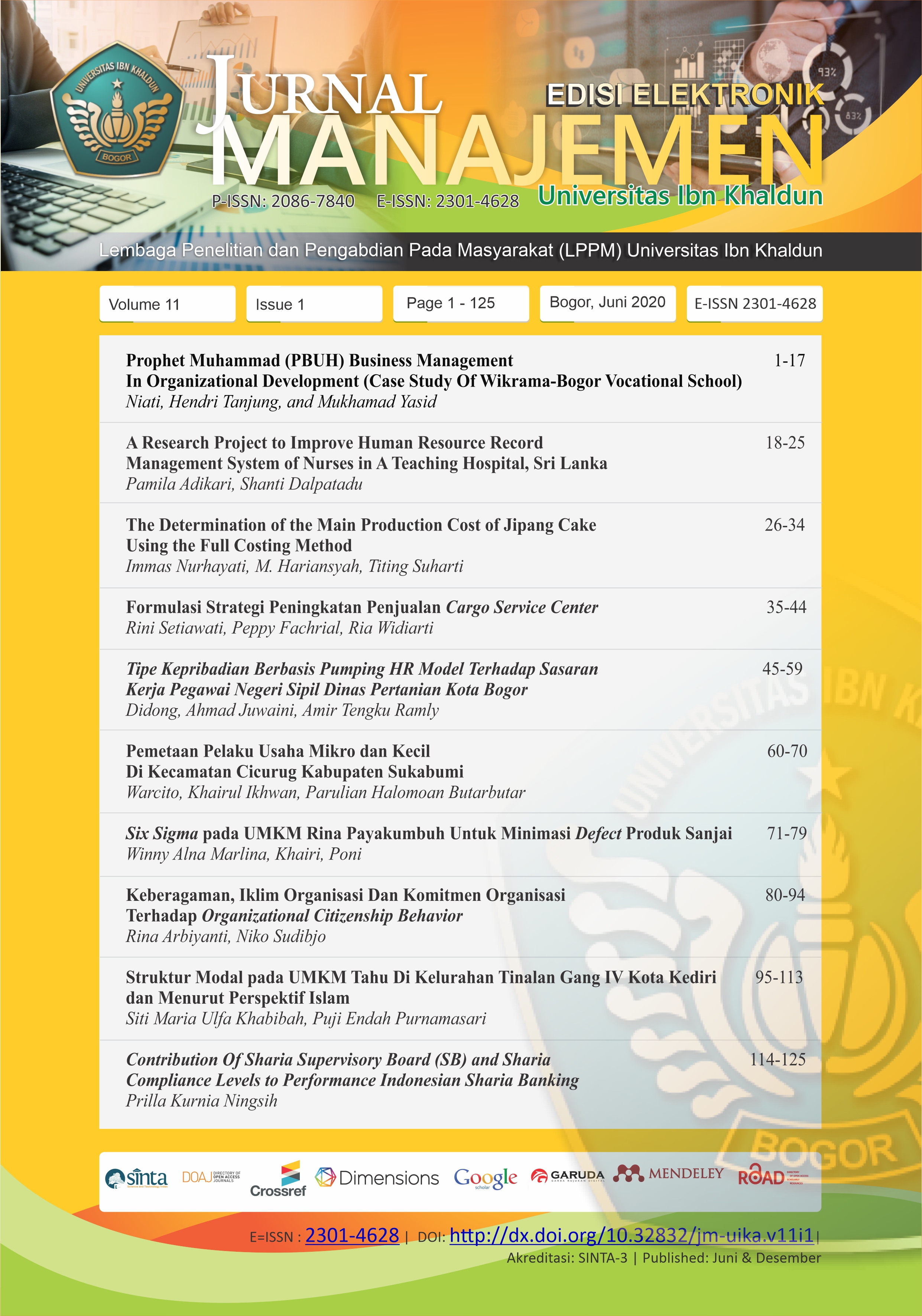Pemetaan Pelaku Usaha Mikro Dan Kecil Di Kecamatan Cicurug Kabupaten Sukabumi
DOI:
https://doi.org/10.32832/jm-uika.v11i1.2861Keywords:
mikro business, small business, UKMAbstract
This study aims to map the potential of micro and small enterprises (MSEs) and describe the success of businesses in the area of assistance of the GNI Foundation in the villages of Nanggerang and Pasawahan Village, Sukabumi. This research is a quantitative descriptive study supported by qualitative data using mixed methods research. The research was carried out in two villages that were deliberately selected and became the area of assistance for the Indonesian Gugah Nurani Foundation (GNI), namely Nanggerang Village (Cibilik, Gintung, Nanggerang1, Nanggerang2) and Pasawahan Village (Pasawahan, Cibuntu, Selaawi, Sindang Palay) Cicurug District, Sukabumi Regency. Based on the survey results, the number of MSEs in the 2 (two) villages 171 businesses with potential in agriculture for Nanggerang village and food processing fields in Pesawahan village. Potential business opportunities in the villages of Nanggerang and Pasawahan villages at this time are the business of agricultural cultivation and food processing. This agricultural cultivation means businesses related to agricultural production such as organic vegetables or healthy vegetables, cultivation of healthy catfish (biofloc technology), healthy chicken cultivation, cultivation of sheep, goats and cows. Market-based agricultural business or market needs. The types of businesses mentioned above have broad market potential with clear target targets. The processed food business in question is a business managed by groups or individuals with local raw materials such as cassava and its derivatives, coconuts and derivatives, and processed fish products. The business success of MSEs in Nanggerang and Pasawahan villages is indicated by the business being run by its own business (86%), business duration of more than 10 years (33%) with a turnover of 1-10 million per month (47%) and contribution to income family more than 75% (37%).
References
Alma, Buchari. (2014). Manajemen Pemasaran dan Pemasaran Jasa. Bandung: CV Alfabeta.
Kecamatan Cicurug Dalam Angka Tahun 2017
Machfoedz, M. 2013. Pengantar Pemasaran Modern. Akademi Manajemen Pemasaran YPKPN, Yogyakarta.
Sarianti, T., Ujang S., Warcito. 2016. Evaluasi Pada Inkubator Wirausaha Sosial Terhadap Pengembangan Usaha Mikro dan Kecil Pada Masing-Masing Tipologi di Wilayah Bogor. Prosiding seminar nasional.
Sehabudin, U., Amiruddin S., Warcito. 2015. Faktor-Faktor Penumbuh Usaha Mikro-Kecil (UMK) Di Wilayah Kota Dan Kabupaten Bo-gor. Journal of Management and Business Review 13 (1). PPM School of Management. Jakarta.
Suhardjono. 2003. Manajemen Perkreditan: Usaha Kecil dan Menengah. AMP YKPN. Yogyakarta.
Undang-undang No. 20 tahun 2008
Warcito. 2014. Analisis Strategi Pengembangan Program Pos Pemberdayaan Keluarga (Posdaya) Di Kota Bogor Dan Kabupaten Bogor. Jurnal Manajemen Universitas IBN Khaldun, Bogor. Vol 5 No.2/2014.
Warcito. 2017. Strategi Pengembangan Usaha Mikro dan Kecil pada Usaha Pengolahan Pangan. Jurnal Manajemen Universitas IBN Khaldun, Bogor. Vol 7 No.2/2017.
Yustika, A.E. 2007. Perekonomian Indonesia. BPFE-UNIBRAW. Malang
Zal, W. A. A., Redzuan, M., Samah, A. A,. & Hamsan, H. H. (2013). The Exploration of Social Capital and Its Relation With Econom-ic Empowerment of Orang Kuala in Johor Malaysia. Pertanika journal social sciences & Humanities. 21 (4) : 1275-1295.
Downloads
Published
How to Cite
Issue
Section
License
Authors who publish with this journal agree to the following terms:
- Authors retain copyright and grant the journal right of first publication with the work simultaneously licensed under a Creative Commons Attribution-NonCommercial-ShareAlike 4.0 International License that allows others to share the work with an acknowledgement of the work's authorship and initial publication in this journal.
- Authors can enter into separate, additional contractual arrangements for the non-exclusive distribution of the journal's published version of the work (e.g., post it to an institutional repository or publish it in a book), with an acknowledgement of its initial publication in this journal.
- Authors are permitted and encouraged to post their work online (e.g., in institutional repositories or on their website) prior to and during the submission process, as it can lead to productive exchanges, as well as earlier and greater citation of published work (See The Effect of Open Access).











